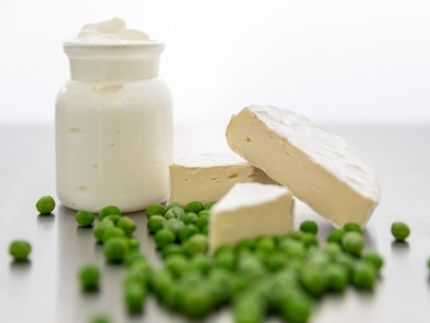For more local pulses in the diet
Two Fulda research teams are investigating how the consumption of regionally grown pulses can be boosted
Pulses are key to the nutritional turnaround. They contain a lot of protein, are rich in fiber and minerals and therefore offer a nutritionally valuable alternative to meat. They also perform well in terms of climate, environment and biodiversity.

No additives, high-quality nutritional profile, good taste: researchers at Fulda University of Applied Sciences are developing a vegan organic meat substitute made from peas and beans that is easy to process in commercial kitchens. All ingredients come from Germany and are also processed here.
Hochschule Fulda / Studienprojekt crEATiv
Despite all the health and ecological benefits: In this country, peas, beans and lentils are still far too rarely found on our plates. The Eat-Lancet Commission recommends 75 grams of pulses per person per day. However, according to the Federal Ministry of Food and Agriculture, the average German eats just seven grams. How can consumption be increased for the benefit of health and the environment?
Understanding socio-cultural and sensory aspects
"We need to better understand why so few pulses are consumed in Germany," says Professor Dr. Jana Rückert-John. The scientist, who holds the Chair of Sociology of Food at Fulda University of Applied Sciences, wants to identify possible barriers and drivers of legume consumption. "If we know what meanings and values different milieus associate with pulses, we can develop recommendations for target group-specific communication and marketing strategies." So far, the topic has hardly been researched.
To get to the bottom of the image of peas, beans and lentils, Dr. Catherina Jansen, a research assistant on the project, is analyzing cookbooks and Instagram posts, among other things. She is also evaluating interviews with experts and consumers. "It's not just about culinary associations, but also about the health and ecological significance attributed to pulses," she explains. The results should be available by September 2026.
Above all, the project hopes to contribute to the consumption of local pulses with this strategy. This is because their cultivation plays an ecologically important role in crop rotation. The Federal Ministry of Food and Agriculture is funding the project as part of its protein crop strategy. The universities of Bonn and Göttingen and the research institutes corsus research and Zühlsdorf+Partner, which are investigating the ecological and economic aspects, are also involved.
From the field to the commercial kitchen - grown and processed in Germany
Another lever for increasing the consumption of domestic pulses is communal catering. This is where an interdisciplinary team at Fulda University of Applied Sciences comes in. It wants to develop a vegan organic meat substitute product made from local peas and beans with a high-quality nutrient profile that can be offered in company catering and canteens, for example.
"The key to success is for a product to meet the requirements of both consumers and commercial kitchens," says Professor Dr. Stephanie Hagspihl, Professor of Catering and Food Supply, adding: "The product should look and taste good, contain no additives, meet the nutritional requirements of guests, but also be easy to process and reasonably priced." The increasing demand for regional and organic products also needs to be taken into account.
In order to meet all requirements, the project is breaking new ground: together with the Research Institute of Organic Agriculture FiBL in Frankfurt, it is looking at the entire value chain - from the choice of variety and cultivation to the production of an extrudate and its processing into a ready-to-eat product, right through to testing its suitability for use in commercial kitchens and acceptance. "All ingredients come from Germany and are also processed here."
Focus group discussions and consumer tests are intended to ensure that the product meets the expectations of different groups of guests in daycare centers, (high) schools, retirement homes and youth hostels. Practical suitability is being tested in various canteen kitchens in Fulda. The project, which is also funded by the Federal Ministry of Food and Agriculture, will run until June 2026, when the results will be made available to the entire organic sector.
Note: This article has been translated using a computer system without human intervention. LUMITOS offers these automatic translations to present a wider range of current news. Since this article has been translated with automatic translation, it is possible that it contains errors in vocabulary, syntax or grammar. The original article in German can be found here.

























































